新编实用英语2 unit1 invitation
新编实用英语2 unit1 invitation
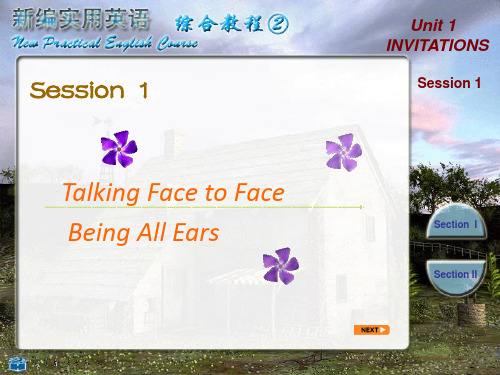
Wang: Yeah, see you then.
Section II
Unit 1 INVITATIONS
Sample 2
Declining an Invitation
Session 1
Chang: Are you doing anything special on Friday,
Section II Section I
Unit 1 INVITATIONS
Sample 1 William: Great. That would be super.
Congratulations! Wang: Thank you. How about eight o’clock? Is that OK? William: Oh yes, fine. Would it be alright if I brought somebody with me? Wang: Yes, of course. William: OK. Fine. Do you want me to bring something to drink? Red wine or white?
Unit 1 INVITATIONS
Session 1
Session 1
Talking Face to Face Being All Ears
Section I
Section II
Unit 1 INVITATIONS
Section I Session 1
Lead in Follow the Samples Act Unit 1 INVITATIONS
Session 1
A: What are you doing on Saturday night?
新编实用英语综合教程二Unit-1-Invitation-EtiquettePPT演示课件
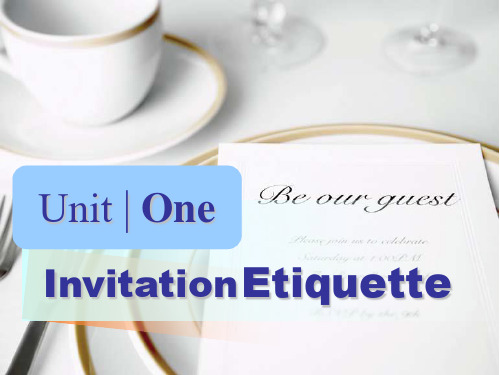
Robert: OK. Thank you for inviting me.
5
Back
Unit | One
3) Inviting friends to a movie Paul: What’re you doing on Saturday night?
Molly: I’m not sure. Why? Paul: Well, I was thinking of asking you to go to a movie with me this weekend.
Unit | One
Invitation Etiquette
1
Unit | One
Unit Goals:
What You Should Learn to Do
1. Make an oral invitation to: invite people to join daily activities invite people to formal occasions
Putting Language to Use
Speak and Complete
Speak and Translate
Speak and Communicate
4
Unit | One
SECTION I Talking Face to Face
Imitating Mini-talks
Speak and Recite
William: Tomorrow evening? Nothing special. Sally: I’m inviting a few friends to my daughter’s birthday party. How would you like to join us?
新编实用英语综合教程2-Unit1InvitationEtiquette教案

Unit 1 Invitation EtiquetteUnit GoalsWhat you should learn to doMake an oral invitation to:Invite people to join daily activitiesInvite people to formal occasionsMake a written invitation(write an invitation card or a letter) for:Personal invitationOfficial occasionsGive a reply to:An oral invitationA written invitationWhat you should know aboutInvitation culture: western and ChineseWord order in a subordinate clauseRequirements:After learning this unit, students should grasp:1. Read and understand the meaning of invitation cards and letters2. How to write invitation cards and letters and remember the patterns of invitation cards and letters3. How to invite people to party or dinner, and how to accept and decline invitations4. The customs of inviting people in different countries5. Important words, phrases and language points in the passageIn our daily life, we need to invite others to dinner or take part in all kinds of parties, so we should know about western custom about invitation.Foreign custom is much stricter than Chinese custom in the matter of replying to invitations. When you receive an invitation you should answer is immediately, saying definitely whether you are able to accept it or not.If the invitation is given by word of mouth, in conversation or at a chance meeting, you should answer at once whether you can come or not. If you cannot give an answer at that time, you may say “ May I let you know this evening ” or some such words. By studying this unit, we will know about how to invite the others, how to accept or decline the invitation, and how to write invitation cards/letters.Section I Talking Face to Face1. Imitating Mini-Talks2. Acting out the Tasks3. Studying Email Information on the Internet4. Following Sample Dialogues5. Putting Language to UseSection II Being All Ears1. Learning Sentences for Workplace Communication2. Handling a Dialogue3. Understanding a Short Speech / TalkSection III Trying your Hand1. Practicing Applied Writing2. Writing Sentences and Reviewing GrammarSection IV Maintaining a Sharp EyePassage 1 :Information Related to the Reading PassageWhether it is to a wedding, a dinner party, shower or gala event, an invitation comes with some important obligations. Here's a quick guide to keep you on the guest list.1. R.S.V.PFrom the French “ R |oondez, s il vous plait ” , it means “ Please reply” Thislittle code has been around for a long time and it ' s definitely telling you that your hosts want to know if you are attending. Reply promptly, within a day or two of receiving an invitation.2. How do I respond? Reply in the manner indicated on the invitation.R.S.V.P and no responsecard: a handwritten responseto the host at the return address on the envelope.Response Card: fill in and reply by the date indicated and return in the enclosed envelope.R.S.V.P with phone number: telephone and make sure to speak in person —answering machines can be unreliable.R.S.V.P with e-mail: you may accept or decline electronically.Regrets only: reply only if you cannot attend. If your host doesn' t hear from you, he is expecting you!No reply requested?Unusual, but it is always polite to let someone know your intentions. A phone call would be sufficient.3. Is that your final answer?Changing a“yes” to a“no” is only acceptable on account of: illness or injury, a death in the family or an unavoidable professional or business conflict. Call your hosts immediately.Canceling because you have a “better” offer is a surefire way to get dropped from ALL the guest lists.Being a “ no show” is unacceptable.Changing a “ no” to a “yes” is OK only if it will not upset the hosts' arrangements.4. “May I bring , ?”Don' t even ask! An invitation is extended to the people the hosts want to invite —and no one else., a date. Some invitations indicate that you may invite a guest or date (Mr. John Evans and Guest) and when you reply, you should indicate whether you are bringing someone, and convey their name., my children. If they were invited, the invitation would have said so., my houseguest. I't s best to decline the invitation, stating the reason. This gives your host the option to extend the invitation to your guests, or not.5. Say “ Thank You.”Make sure to thank your hosts before you leave, and then again by phone or note the next day.Text Business InvitationA case of mistaken identity!Don' t worry, we' ve been assured that this mystery will besolved in time for ourHoliday Office PartyWe' re leaving the investigation to those who do it best.Let' s get away from all those computers, papers and mess and cometo our office party in your best suit or dress.Come join us and Toast the SeasonThursday, December 9th 2010 5:00 P.M.The Columbia House - Pen thouse Floor 485 Jeffers on PlazaLeonard, Barley, Travis, Bailey and SmithRegrets only to Dianne 248-8522It would be a crime to miss our party or not be on time485 Jefferson PlazaBusiness invitations can be informal or formal. Although invitations are usually sent through the mail, informal invitations such as e-mail and phone invitations are becoming more acceptable.Invitation TimingFor most formal occasions, it's best to invite guests three or four weeks in advance. If you choose to invite your guests by phone, remind them again in writing two weeks before the gathering. Here are a few guidelines for your information: • Six to eight months before an important seminar to which out-of-town executives are invited.• Four weeks before an evening reception.• Two to four weeks before a cocktail party.Invitation FormatFormal business invitations are most commonly printed on white or off-white high-quality paper. Acompany can use any color of paper it desires, as long as it upholds and promotes the compan'y s image.With preprinted invitations, you simply fill in the blanks to tell what, where, and when the party will be and who is giving it. It 's also acceptable to include an RSVP notation and your phone number or address on the invitation for more accurate planning.Responding to an InvitationEither use the address or phone number printed in the lower left corner of the invitation or return the RSVP card sent with the invitation. If a “Please reply by” a given date is included in the invitation, be polite enough to reply by that date. If the words “Regrets only” are printed in the lower left corner of the invitation, you need only to inform the host if you will not be able to attend. If your host does not hear from you, you are expected to attend.Never ask to bring a guest unless the invitation states“Mr. Louis Winthorp and Guest.” Most likely, the host will have only enough food and drinks for the number of people he invites. Showing up with an uninvited friend could turn out to be an embarrassing situation for everyone.Language Points1 Explanation of Difficult Sentences1. (Para. 1) Although invitations are usually sent through the mail, informal invitations such as e-mails and phone invitations are becoming more acceptable. Analysis: such as means“of the same kind, like” and should be followed by nouns or noun phrases.Translation: 虽然邀请函通常通过信函方式发出,但目前像电子邮件、电话邀请等非正式邀请越来越被普遍使用。
新编实用英语2 unit1 invitation

Unit 1 INVITATIONS
Session 1
Section I
Section II
Follow the Samples
Warm-up Questions Sample 1 Sample 2
Unit 1 INVITATIONS
Session 1
Section I Section II
Follow the Samples
Warm-up Questions
Unit 1 INVITATIONS
Session 1
1.Do you know how to make an invitation?
A: Would you like to join us? B: Great. That would be superb. Congratulations! A: Come and join us for a nice chat. B: OK, that would be marvelous. Thanks.
Lead in
Warm-up Questions
Unit 1 INVITATIONS
Session 1
1.What are the two cards you are reading now?
2.Why do people write an invitation card?
Section I
Section II
Wang: Hello, William. What are you doing tomorrow evening?
William: Tomorrow evening? Nothing special, I was thinking of watching TV.
新编实用英语2 unit1 invitation教案资料

Section I Section II
Lead in
Unit 1 INVITATIONS
Session 1
Warm-up Questions The First Invitation Card The Second Invitation Card
Section I Section II
B: I’d love to and I’m sure Mr. Johnson would, too. But I wonder if we could make it some other time if it is convenient for you.
A: May I invite you to attend our debate ?
William: Tomorrow evening? Nothing special, I was thinking of watching TV.
Wang: Drag yourself away from television for a change. I’m having a few friends to have a dinner party tomorrow to celebrate my daughter’s birthday. How would you like to join us?
Unit 1 INVITATIONS
Lead in
Invitation Cards and Letters
Session 1
Invitation cards are often used for inviting people. Now let’s read the following sample cards and practice two short dialogues.
新编实用英语综合教程二Unit-1-Invitation-EtiquettePPT课件
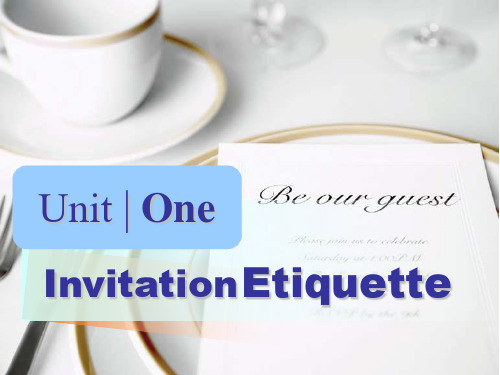
3 Task: Invite your friend to go to the early show of the movie “My Fair Lady”.
4 Task: Decline your friend’s invitation to go dancing next Friday afternoon.
Robert: OK. Thank you for inviting me.
5
Back
Unit | One
3) Inviting friends to a movie Paul: What’re you doing on Saturday night?
Molly: I’m not sure. Why? Paul: Well, I was thinking of asking you to go to a movie with me this weekend.
Smith: Yes, Mr. Johnson and I have promised to call on some friends at the
embassy.
Chang: Oh, what a pity!
Smith: What did you have in mind?
Chang: We were thinking of asking you and Mr. Johnson to go to the Great Wall.
really special. Cindy: Oh, thanks, but ... maybe some other time. I’m very busy tonight.
Window on Key Words
好极了
祝贺
新编实用英语综合教程二unit 1 invitation etiquette (课堂PPT)
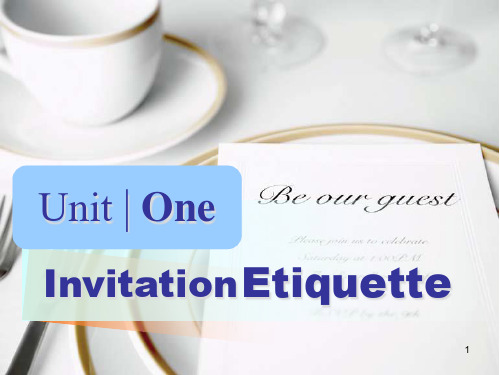
Back
5 Unit | One
3) Inviting friends to a movie Paul: What’re you doing on Saturday night?
Molly: I’m not sure. Why? Paul: Well, I was thinking of asking you to go to a movie with me this weekend.
Molly: Oh, why not? 4) Declining an invitation to go roller-skating
Mike: Would you like to go roller-skating with me this Saturday afternoon? Sarah: Saturday afternoon? I’m afraid I won’t be able to. Mike: What about Sunday afternoon? Sarah: That would be nice. 5) Declining an invitation to go out to dinner Steve: Well, thank goodness it’s Friday, Jean. Cindy: Yes, it was a long week, Ken. Steve: Would you like to go out to dinner tonight? I’d like to take you somewhere
William: Tomorrow evening? Nothing special. Sally: I’m inviting a few friends to my daughter’s birthday party. How would you like to join us?
新编实用英语2 unit1 invitation PPT

Wang: My pleasure. William: I’ll be along at eight. Looking forward to it.
Wang: Yeah, see you then.
2. Who is the person invited?
3. What activity is going to take place?
Follow the Samples
Warm-up Questions Sample 1 Sample 2
Follow the Samples
Warm-up Questions
4.Where will the dinner party be held?
Lead in
Invitation Cards and Letters
Lead in
Questions for understanding the second invitation card:
1. Who is the inviteuestions
2.Do you know how to decline an invitation?
A: We were thinking of asking you and Mr. Johnson to go to the Great Wall.
Wang: Yes, of course. William: OK. Fine. Do you want me to bring something to
drink? Red wine or white?
新编实用英语综合教程2 -Unit 1 Invitation Etiquette教案
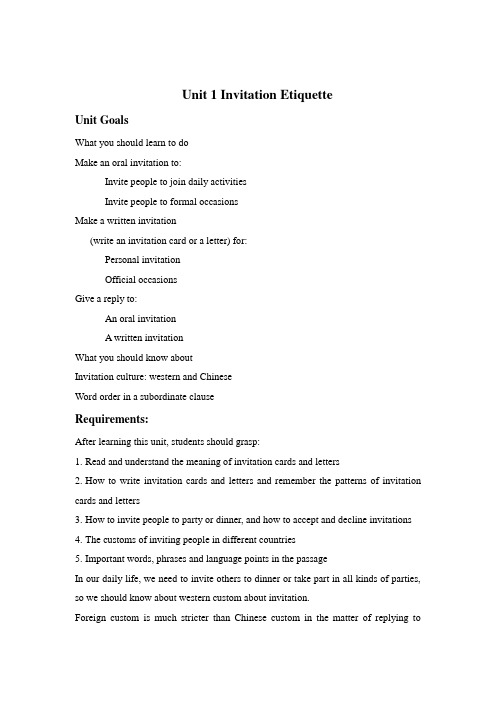
Unit 1 Invitation EtiquetteUnit GoalsWhat you should learn to doMake an oral invitation to:Invite people to join daily activitiesInvite people to formal occasionsMake a written invitation(write an invitation card or a letter) for:Personal invitationOfficial occasionsGive a reply to:An oral invitationA written invitationWhat you should know aboutInvitation culture: western and ChineseWord order in a subordinate clauseRequirements:After learning this unit, students should grasp:1.Read and understand the meaning of invitation cards and letters2.How to write invitation cards and letters and remember the patterns of invitation cards and letters3.How to invite people to party or dinner, and how to accept and decline invitations4.The customs of inviting people in different countries5.Important words, phrases and language points in the passageIn our daily life, we need to invite others to dinner or take part in all kinds of parties, so we should know about western custom about invitation.Foreign custom is much stricter than Chinese custom in the matter of replying toinvitations. When you receive an invitation you should answer is immediately, saying definitely whether you are able to accept it or not.If the invitation is given by word of mouth, in conversation or at a chance meeting, you should answer at once whether you can come or not. If you cannot give an answer at that time, you may say “May I let you know this evening” or some such words.By studying this unit, we will know about how to invite the others, how to accept or decline the invitation, and how to write invitation cards/letters.Section I Talking Face to Face1.Imitating Mini-Talks2.Acting out the Tasks3.Studying Email Information on the Internet4.Following Sample Dialogues5.Putting Language to UseSection II Being All Ears1.Learning Sentences for Workplace Communication2.Handling a Dialogue3.Understanding a Short Speech / TalkSection III Trying your Hand1.Practicing Applied Writing2.Writing Sentences and Reviewing GrammarSection IV Maintaining a Sharp EyePassage 1 :Information Related to the Reading PassageWhether it is to a wedding, a dinner party, shower or gala event, an invitation comes with some important obligations. Here’s a quick guide to keep you on the guest list.1. R.S.V.PFrom the French “Répondez, s’il vous plait”, it means “Please reply.”Thislittle code has been around for a long time and it’s definitely telling you that your hosts want to know if you are attending. Reply promptly, within a day or two of receiving an invitation.2. How do I respond? Reply in the manner indicated on the invitation.R.S.V.P and no response card: a handwritten response to the host at the return address on the envelope.Response Card: fill in and reply by the date indicated and return in the enclosed envelope.R.S.V.P with phone number: telephone and make sure to speak in person —answering machines can be unreliable.R.S.V.P with e-mail: you may accept or decline electronically.Regrets only: reply only if you cannot attend. If your host doesn’t hear from you, he is expecting you!No reply requested? Unusual, but it is always polite to let someone know your intentions. A phone call would be sufficient.3. Is that your final answer?Changing a “yes”to a “no”is only acceptable on account of: illness or injury, a death in the family or an unavoidable professional or business conflict. Call your hosts immediately.Canceling because you have a “better”offer is a surefire way to get dropped from ALL the guest lists.Being a “no show”is unacceptable.Changing a “no”to a “yes”is OK only if it will not upset the hosts’arrangements.4. “May I bring …?”Don’t even ask! An invitation is extended to the people the hosts want to invite —and no one else.…a date. Some invitations indicate that you may invite a guest or date (Mr. JohnEvans and Guest) and when you reply, you should indicate whether you are bringing someone, and convey their name.…my children. If they were invited, the invitation would have said so.…my houseguest. It’s best to decline the invitation, stating the reason. This gives your host the option to extend the invitation to your guests, or not.5. Say “Thank You.”Make sure to thank your hosts before you leave, and then again by phoneor note the next day.Text Business InvitationA case of mistaken identity!Don’t worry, we’ve been assured that this mystery will besolved in time for ourHoliday Office PartyWe’re leaving the investigation to those who do it best.Let’s get away from all those computers, papers and mess and cometo our office party in your best suit or dress.Come join us and Toast the SeasonThursday, December 9th 2010 5:00 P.M.The Columbia House –Penthouse Floor 485 Jefferson PlazaLeonard, Barley, Travis, Bailey and SmithRegrets only to Dianne 248-8522It would be a crime to miss our party or not be on time485 Jefferson PlazaBusiness invitations can be informal or formal. Although invitations are usually sent through the mail, informal invitations such as e-mail and phone invitations are becoming more acceptable.Invitation TimingFor most formal occasions, it’s best to invite guests three or four weeks inadvance. If you choose to invite your guests by phone, remind them again in writing two weeks before the gathering. Here are a few guidelines for your information:●Six to eight months before an important seminar to which out-of-town executives are invited.●Four weeks before an evening reception.●Two to four weeks before a cocktail party.Invitation FormatFormal business invitations are most commonly printed on white or off-white high-quality paper. A company can use any color of paper it desires, as long as it upholds and promotes the company’s image.With preprinted invitations, you simply fill in the blanks to tell what, where, and when the party will be and who is giving it. It’s also acceptable to include an RSVP notation and your phone number or address on the invitation for more accurate planning.Responding to an InvitationEither use the address or phone number printed in the lower left corner of the invitation or return the RSVP card sent with the invitation. If a “Please reply by”a given date is included in the invitation, be polite enough to reply by that date. If the words “Regrets only”are printed in the lower left corner of the invitation, you need only to inform the host if you will not be able to attend. If your host does not hear from you, you are expected to attend.Never ask to bring a guest unless the invitation states “Mr. Louis Winthorp and Guest.”Most likely, the host will have only enough food and drinks for the number of people he invites. Showing up with an uninvited friend could turn out to be an embarrassing situation for everyone.Language Points1 Explanation of Difficult Sentences1. (Para. 1) Although invitations are usually sent through the mail, informalinvitations such as e-mails and phone invitations are becoming more acceptable. Analysis: such as means “of the same kind, like”and should be followed by nouns or noun phrases.Translation: 虽然邀请函通常通过信函方式发出,但目前像电子邮件、电话邀请等非正式邀请越来越被普遍使用。
- 1、下载文档前请自行甄别文档内容的完整性,平台不提供额外的编辑、内容补充、找答案等附加服务。
- 2、"仅部分预览"的文档,不可在线预览部分如存在完整性等问题,可反馈申请退款(可完整预览的文档不适用该条件!)。
- 3、如文档侵犯您的权益,请联系客服反馈,我们会尽快为您处理(人工客服工作时间:9:00-18:30)。
Chang: We were thinking of asking you and Mr.
Johnson to go to the Great Wall.
Section II
Unit 1 INVITATIONS
Sample 2
Smith: I’d love to and I’m sure Mr. Johnson would, too. I wonder if we could make it some other time if it is convenient?
Section I
A: Come and join us for a nice chat. B: OK, that would be marvelous. Thanks.
Section II
Unit 1 INVITATIONS
Follow the Samples
Session 1
Warm-up Questions
3.When are they going to hold the dinner party? 4.Where will the dinner party be held?
Section I
Section II
Unit 1 INVITATIONS Lead in
Invitation Cards and Letters
Session 1
Warm-up Questions
1.What are the two cards you are reading now? 2.Why do people write an invitation card?
Section I
Section II
Unit 1 INVITATIONS Lead in
Section II
Unit 1 INVITATIONS
Session 1
A: What are you doing on Saturday night?
B: I’m not sure. Why? A: Well, I was thinking of going to a movie with you
this weekend.
B: Sounds great.
Section I
Task: Invite your friend to go to a concert on Friday evening.
Section II
Unit 1 INVITATIONS
Session 1
A: What are you going to do this weekend. Jenny? Got any plans? B: Want to see a movie? “Ghost” is on at the Marina. A: Yeah. Why not? The early show or the late show? B: Let’s go to the late show, and we could do something afterward. Maybe go dancing or hear some music.
Section I
Section II
Unit 1 INVITATIONS Lead in
Questions for understanding the first invitation card:
1.Who are the inviters? Session 1
2.Why are they going to hold a dinner party?
Session 1
Chang: What about Saturday? But I need to alert you
that the coach will leave quite early at 7 o’clock. Smith: I’ll ask Mr. Johnson if he has any plans, but I think it’ll be all right. Suppose I give you a ring this afternoon and let you know. Chang: That would be fine.
Unit 1 INVITATIONS
Follow the Samples
Session 1
Warm-up Questions
1.Do you know how to make an invitation?
A: Would you like to join us?
B: Great. That would be superb. Congratulations!
Section I
Section II
Unit 1 INVITATIONS
Sample 1
Inviting Friends to a Party
Session 1
Wang: Hello, William. What are you doing tomorቤተ መጻሕፍቲ ባይዱow evening? William: Tomorrow evening? Nothing special, I was
Section II Section I
Unit 1 INVITATIONS
Sample 1 William: Great. That would be super.
Congratulations! Wang: Thank you. How about eight o’clock? Is that OK? William: Oh yes, fine. Would it be alright if I brought somebody with me? Wang: Yes, of course. William: OK. Fine. Do you want me to bring something to drink? Red wine or white?
Session 1
Section I
Section II
Unit 1 INVITATIONS Lead in
Questions for understanding the second invitation card:
1. Who is the inviter? Session 1
2. Who is the person invited?
3. What activity is going to take place?
Section I
Section II
Unit 1 INVITATIONS
Follow the Samples
Session 1
Warm-up Questions Sample 1
Section I
Sample 2
Section II
2.Do you know how to decline an invitation?
A: We were thinking of asking you and Mr. Johnson to go to the Great Wall. B: I’d love to and I’m sure Mr. Johnson would, too. But I wonder if we could make it some other time if it is convenient for you. A: May I invite you to attend our debate ? B: Thank you, but I’m afraid I’ve arranged to go to a concert then.
Mr. Smith? Smith: Yes, Mr. Johnson and I have promised to call on some friends at the embassy. Chang: Oh, what a pity! Smith: What did you have in mind?
Unit 1 INVITATIONS
Session 1
Session 1
Talking Face to Face Being All Ears
Section I
Section II
Unit 1 INVITATIONS
Section I Session 1
Lead in Follow the Samples Act out Put in Use
B: Good idea. Where do you want to go?
A: Oh, I’ve no idea yet. How about going to the
Section I
downtown pool?
B: Okay. That’s fine with me.
Task: Suggest going skiing with your friend.
Invitation Cards and Letters Session 1
Invitation cards are often used for inviting people. Now let’s read the following sample cards and practice two short dialogues.
Section I
Wang: Yeah, see you then.
Section II
Unit 1 INVITATIONS
Sample 2
Declining an Invitation
Session 1
Chang: Are you doing anything special on Friday,
